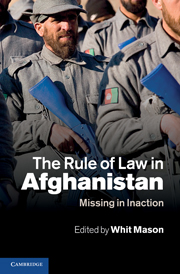Book contents
- Frontmatter
- Contents
- Contributors
- Preface and acknowledgements
- 1 Introduction
- PART I The scope and nature of the problem
- PART II The context
- PART III The political economy of opium
- 7 The Afghan insurgency and organised crime
- 8 Afghanistan's opium strategy alternatives – a moment for masterful inactivity?
- PART IV Afghan approaches to security and the rule of law
- PART V International interventions
- PART VI Kandahar
- PART VII Conclusion
- Index
- References
7 - The Afghan insurgency and organised crime
Published online by Cambridge University Press: 01 June 2011
- Frontmatter
- Contents
- Contributors
- Preface and acknowledgements
- 1 Introduction
- PART I The scope and nature of the problem
- PART II The context
- PART III The political economy of opium
- 7 The Afghan insurgency and organised crime
- 8 Afghanistan's opium strategy alternatives – a moment for masterful inactivity?
- PART IV Afghan approaches to security and the rule of law
- PART V International interventions
- PART VI Kandahar
- PART VII Conclusion
- Index
- References
Summary
Insurgents and counter-insurgents in Afghanistan are evolving in parallel. Both have come to recognise that achieving ultimate success requires winning the support of the people. This realisation has led both sides to try to limit the harm they cause while maximising their perceived benefits. For each this demands difficult trade-offs. For the NATO coalition, it means limiting civilian casualties and other negative impacts inflicted in the course of operations to eliminate insurgents. For the Taliban, it means limiting the violence done in the course of carrying out criminal activities that have become an increasingly important source of financial support.
Militant groups on either side of the frontier function like a broad network of criminal gangs, not just in terms of the activities in which they engage, but in the way they are organised, how funds flow through their command chains, and how they interact with each other. Within this complex adaptive system, criminal profits fund the insurgency, while terrorist violence helps militants to coerce and exert a level of control over local communities. Within a realm of poor governance, widespread state corruption and predation by local powerbrokers, the Taliban and other belligerent groups engage in and protect organised crime – mainly smuggling, extortion and kidnapping. Organised crime helps the insurgents to raise funds, and – whether by design or by accident – has effectively become a key element of their asymmetric warfare campaign, spreading fear and insecurity.
- Type
- Chapter
- Information
- The Rule of Law in AfghanistanMissing in Inaction, pp. 99 - 122Publisher: Cambridge University PressPrint publication year: 2011
References
- 4
- Cited by



